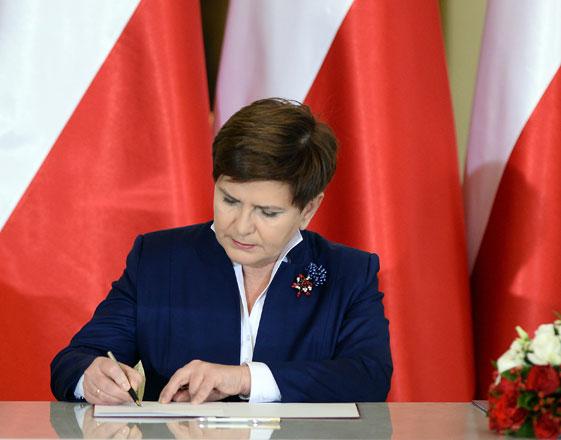You are here
Poland’s new right-wing government takes hard line on migrant crisis
By AFP - Nov 16,2015 - Last updated at Nov 16,2015

Beata Szydlo signs her letter of appointment as she is sworn in as new Polish prime minister during a ceremony for the new conservative Cabinet at the Presidential Palace in Warsaw, on Monday (AFP photo)
WARSAW — Poland's new right-wing, eurosceptic government was sworn in Monday signalling it would take a hard line on Europe's biggest migrant crisis since World War II — even floating the idea of sending Syrians back to "liberate" their country.
The new Cabinet observed a minute's silence for the victims of the worst-ever terror attacks in France at the swearing-in ceremony at Warsaw's presidential palace.
Earlier, Prime Minister Beata Szydlo led her Cabinet in laying flowers and lighting candles in front of the French embassy in memory of the at least 129 victims of Friday's attacks.
She is in the comfortable position of leading a majority government and therefore controlling parliament, thanks to her Law and Justice (PiS) Party's landmark victory in the October 25 election.
She can also expect a helping hand from PiS-backed President Andrzej Duda.
During the election campaign the party vowed to close Poland's doors to refugees and migrants and instead lend financial support to EU efforts at tackling the crisis.
It also promised to hike welfare spending and taxes on banks and foreign-owned supermarkets.
New Foreign Minister Witold Waszczykowski suggested Sunday that the hundreds of thousands of Syrian refugees pouring into Europe could be trained to form an army and return to "liberate" their homeland.
"Hundreds of thousands of Syrians have come to Europe recently. We can help them form an army," he said.
"Tens of thousands of young men disembark from their rubber dinghies with iPad in hand and instead of asking for drink or food, they ask where they can charge their cellphones.
"They can go to fight to liberate their country with our help."
Waszczykowski said he was trying to avoid a situation where "we send our soldiers to fight in Syria while hundreds of thousands of Syrians drink their coffee in [Berlin's] Unter den Linden" boulevard or in other European cities.
He insisted Poland would meet the commitments made by the previous liberal government to host more than 9,000 refugees in the framework of the EU's relocation plan.
Waszczykowski's reassurance came after a Saturday statement by the deputy minister for EU affairs, Konrad Szymanski, who said that because of the Paris terror attacks, Poland would not take in refugees under the hotly contested EU redistribution programme.
'Security guarantees'
"The European Council's decisions, which we criticised, on the relocation of refugees and immigrants to all EU countries are part of European law," Szymanski wrote on right-leaning website wPolityce.pl.
But "after the tragic events of Paris we do not see the political possibility of respecting them," he said.
"Poland must retain complete control of its borders, as well as its asylum and migration policy."
Szymanski said that Friday's attacks in Paris were "directly" connected to both the migrant crisis and France's involvement in air strikes on Daesh positions.
A known eurosceptic, Szymanski later appeared to backtrack on his words, insisting Poland would only take in refugees "on the condition it gets security guarantees".
Szydlo, a 52-year-old coal miner's daughter, has vowed to "fix" Poland.
Priorities include a family allowance of 500 zloty (117 euros, $126) per child to boost low birth rates, lowering the pension age, increasing tax exemptions for lower income earners, tax cuts for small and medium businesses and tax hikes for banks and foreign-owned supermarkets.
The conservatives also say they will create 1.2 million jobs at home to stem the flow of Poles to western EU states like Britain and Germany in search of jobs and a better life.
Despite a global push to cut greenhouse gas emissions, the PiS government has vowed to keep coal as Poland's main source of electricity. To do so, it wants to renegotiate its commitments on emissions cuts.
Related Articles
WARSAW — The Eurosceptic Law and Justice Party (PiS) has become the first party to win an outright majority in the Polish parliament since t
LONDON — Britain's prime minister appealed to doubters at home and in other EU capitals on Tuesday to back his attempt to reform the 28-memb
WARSAW — Poland's government on Thursday estimated the financial cost of World War II losses to be 1.3 trillion euros (dollars) and said it

















